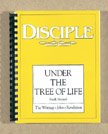 My earliest study of Ecclesiastes proved very refreshing after the better part of the Old Testament leading me to believe that all that was required to have a successful, strife-less life was to obey God. Ecclesiastes gives me the impression that the "Teacher" just got tired of reading all of that sun shining out of the bottom of the righteous and decided to let the faithful in on truth - there is no free lunch; there is no pot of gold at the end or the rainbow; and one doesn't collect $200.00 when passing "Go."
My earliest study of Ecclesiastes proved very refreshing after the better part of the Old Testament leading me to believe that all that was required to have a successful, strife-less life was to obey God. Ecclesiastes gives me the impression that the "Teacher" just got tired of reading all of that sun shining out of the bottom of the righteous and decided to let the faithful in on truth - there is no free lunch; there is no pot of gold at the end or the rainbow; and one doesn't collect $200.00 when passing "Go."The writer reflects a anger and disillusionment about the fact that he or she had spent so much time going to school, living, and obtaining wisdom only to learn that having all of that wisdom made no difference...we will all end up the same way, dead. It is almost cliche:
To every season, turn, turn, turn...
The answer, my friend, is blowing in the wind...
Dust in the wind; all we are is dust in the wind...
Give a drink of my wine to my jersey cow / I wouldn't give a hoot-in-hell for my journey now...
This realization made the dense lines of the last lesson less opaque (Proverbs 23:1-5):
1 When you sit down to eat with a ruler,
observe carefully what is before you,
2 and put a knife to your throat
if you have a big appetite.
3 Do not desire the ruler's delicacies,
for they are deceptive food.
4 Do not wear yourself out to get rich;
be wise enough to desist.
5 When your eyes light upon it, it is gone;
for suddenly it takes wings to itself,
flying like an eagle toward heaven.
This passage says, "don't spend too much time accumulating things as it will ultimately be a waste. Enjoy yourself while your work and don't sweat the small stuff, because it is all small stuff. It also encourages the reader not to covet fame and notoriety as that my very well lead to infamy.
Conventional wisdom (Biblically, such as it is) suspects that Solomon wrote Ecclesiastes. If the King indeed did write the Book, he did so after all of his success and after he got bored with said success. Ecclesiastes is the work of a curmudgeon, a really brilliant one.
© Copyright, C. Michael Bailey, 2006
